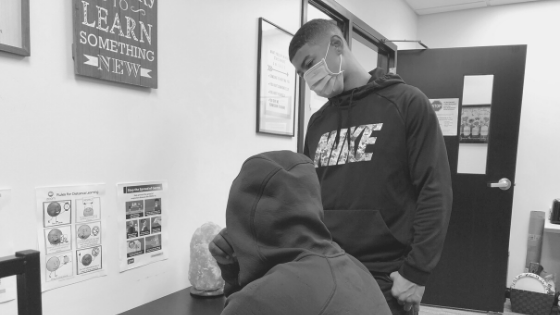Inside the Learning Pods: 'We're encouraging each other through life'
Jay Wehrenberg is a Project Legacy youth development specialist, Marine Corps veteran, and full-time RCTC student. He works at Project Legacy’s learning pods on Thursdays, primarily with a group of 7th grade boys. We caught up with him about his experience so far at the pods.
BL: How did your involvement with the learning pods come about?
JW: I was initially informed about it from Karen. She told me if I wanted to get involved with the community, being involved with the learning pods was a direct way to make a difference. I think that it was my way to find self-fulfillment, and also a learning experience for both the kids and myself: brushing up on some of those old learning techniques and that type of thing.
BL: What’s been the toughest subject to ‘teach’?
I mean, I always struggled with math. I think that was my biggest difficulty, but then I also found it kind of fun, because I was teaching myself along with the kids, too.
BL: What does it mean for you to engage in direct involvement with the community?
JW: For me, direct involvement means personal development. Just to see myself grow and learn how different people come from different backgrounds...they learn differently and think differently.
To see a change in the community, you have to see a change in yourself. And I think that’s really helped me develop a stronger sense of community and self development early. But I think it's more of a hands on thing.
It's also good to see, like, ‘Wow, this is what we're priming the future with.’ Helping these kids to know how important it is to stay focused and stay involved in school right now, because it sets up their future.
BL: What are some techniques you’ve used to keep the students engaged?
JW: One of the big techniques that we did was just having “recess” or just free time where we would just go and do some activities. Just to get the blood flowing and step away from the screen, because so much screentime can really can really give you fatigue or a fog. I know even as an adult, I have classes, or Zoom meetings, for hours on end. And it's such an excessive stress. But then you think about... kids are adolescents doing this for three, four days a week, six to eight hours a day, and it's like, ‘Man, that's a full workday.’
I think the biggest strategy to keep kids engaged is giving them that time to have a break and be a kid for a little bit, and then get back plugged in.
BL: What have you noticed about these students that makes you feel optimistic for the future?
JW: Obviously, we're limited on how many how many youth we could have together, but to see the group work with any trouble with each other and encourage each other to do more work or to just to stay focused, I think that that was really reassuring, because I think that that's a big important part to society, to how the community works.
To be able to work with each other and encourage each other through life, that's how you develop strong friends and strong connections with people. I think that's the biggest thing that we've taken for granted with COVID, is that strong connections are taken away so easily. That's really one of the small, but also big, pieces that I've taken away from working with the youth - seeing them to be able to pick up on those things: ‘Hey, we may not be in a classroom full of our peers anymore, but I still have you, you still have me. And when we have that time to go out and play, we can talk about school or just what life is like right now.’
Bryan Lund is a writer, English professor and the facilitator of the Project Legacy Young Writer’s Workshop and Speakers’ Forum.

